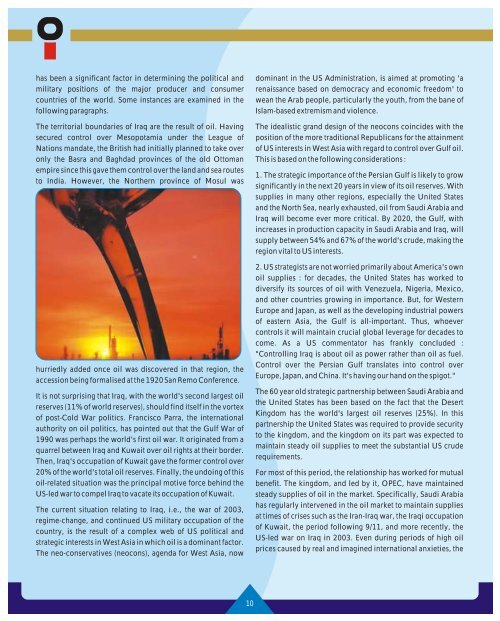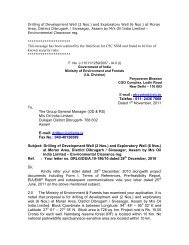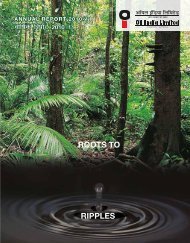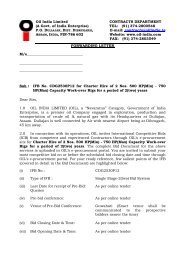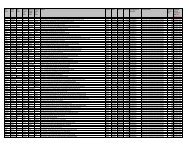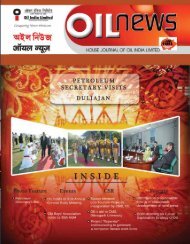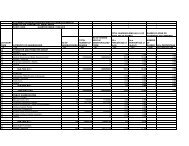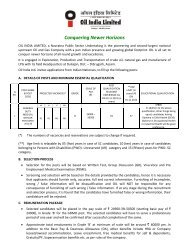2006 - Oil India Limited
2006 - Oil India Limited
2006 - Oil India Limited
You also want an ePaper? Increase the reach of your titles
YUMPU automatically turns print PDFs into web optimized ePapers that Google loves.
has been a significant factor in determining the political and<br />
military positions of the major producer and consumer<br />
countries of the world. Some instances are examined in the<br />
following paragraphs.<br />
dominant in the US Administration, is aimed at promoting 'a<br />
renaissance based on democracy and economic freedom' to<br />
wean the Arab people, particularly the youth, from the bane of<br />
Islam-based extremism and violence.<br />
The territorial boundaries of Iraq are the result of oil. Having The idealistic grand design of the neocons coincides with the<br />
secured control over Mesopotamia under the League of position of the more traditional Republicans for the attainment<br />
Nations mandate, the British had initially planned to take over of US interests in West Asia with regard to control over Gulf oil.<br />
only the Basra and Baghdad provinces of the old Ottoman This is based on the following considerations :<br />
empire since this gave them control over the land and sea routes<br />
1. The strategic importance of the Persian Gulf is likely to grow<br />
to <strong>India</strong>. However, the Northern province of Mosul was significantly in the next 20 years in view of its oil reserves. With<br />
supplies in many other regions, especially the United States<br />
and the North Sea, nearly exhausted, oil from Saudi Arabia and<br />
Iraq will become ever more critical. By 2020, the Gulf, with<br />
increases in production capacity in Saudi Arabia and Iraq, will<br />
supply between 54% and 67% of the world's crude, making the<br />
region vital to US interests.<br />
hurriedly added once oil was discovered in that region, the<br />
accession being formalised at the 1920 San Remo Conference.<br />
2. US strategists are not worried primarily about America's own<br />
oil supplies : for decades, the United States has worked to<br />
diversify its sources of oil with Venezuela, Nigeria, Mexico,<br />
and other countries growing in importance. But, for Western<br />
Europe and Japan, as well as the developing industrial powers<br />
of eastern Asia, the Gulf is all-important. Thus, whoever<br />
controls it will maintain crucial global leverage for decades to<br />
come. As a US commentator has frankly concluded :<br />
"Controlling Iraq is about oil as power rather than oil as fuel.<br />
Control over the Persian Gulf translates into control over<br />
Europe, Japan, and China. It's having our hand on the spigot."<br />
The 60 year old strategic partnership between Saudi Arabia and<br />
It is not surprising that Iraq, with the world's second largest oil<br />
the United States has been based on the fact that the Desert<br />
reserves (11% of world reserves), should find itself in the vortex<br />
Kingdom has the world's largest oil reserves (25%). In this<br />
of post-Cold War politics. Francisco Parra, the international<br />
partnership the United States was required to provide security<br />
authority on oil politics, has pointed out that the Gulf War of<br />
to the kingdom, and the kingdom on its part was expected to<br />
1990 was perhaps the world's first oil war. It originated from a<br />
maintain steady oil supplies to meet the substantial US crude<br />
quarrel between Iraq and Kuwait over oil rights at their border.<br />
requirements.<br />
Then, Iraq's occupation of Kuwait gave the former control over<br />
20% of the world's total oil reserves. Finally, the undoing of this For most of this period, the relationship has worked for mutual<br />
oil-related situation was the principal motive force behind the benefit. The kingdom, and led by it, OPEC, have maintained<br />
US-led war to compel Iraq to vacate its occupation of Kuwait. steady supplies of oil in the market. Specifically, Saudi Arabia<br />
has regularly intervened in the oil market to maintain supplies<br />
The current situation relating to Iraq, i.e., the war of 2003,<br />
at times of crises such as the Iran-Iraq war, the Iraqi occupation<br />
regime-change, and continued US military occupation of the<br />
of Kuwait, the period following 9/11, and more recently, the<br />
country, is the result of a complex web of US political and<br />
US-led war on Iraq in 2003. Even during periods of high oil<br />
strategic interests in West Asia in which oil is a dominant factor.<br />
prices caused by real and imagined international anxieties, the<br />
The neo-conservatives (neocons), agenda for West Asia, now<br />
10


